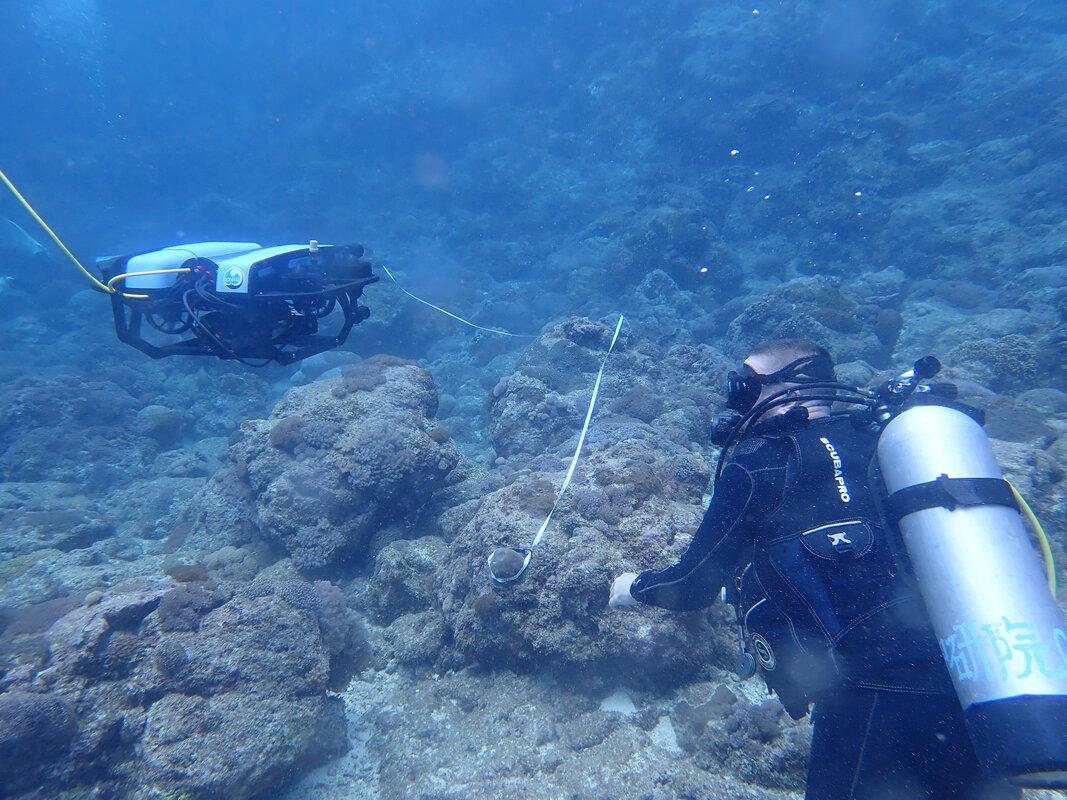Field course in coral reef ecology - 3 credits
… applied knowledge to the understanding of the coral reef ecosystem
|
Strange encounter, Ludao, Taiwan (2019)
|
Overview
This course is designed to provide the student with a solid foundation in ecological concepts, techniques and experimental design in field research as applied to coral reef ecosystems. It consists of a one-week field-based research at a marine research station in Taiwan. To have attended Ocean 5097 is strongly recommended before joining this course. Alternatively, solid knowledge of coral reefs and the environmental challenges they are facing is requested. The course will begin with a general introduction of the coral reefs and how they are influenced by global an local factors. It will quickly narrow down to the context of Taiwan by introducing the local context: known diversity, past disturbances, and on-going research. The major reef biota will be discussed in terns of their ecological requirements, roles on the reef and their overall impact. Methods in ecological monitoring and sampling will be discussed and applied on the field and will serve as a baseline for a future long-term ecological assessment. Data analysis will consit of examining and comparing structure of benthic assemblages among sites and depths (basic knowledge of R software is recommended). Students are asked to provide a poster (electronic format) summarizing their work a maximum of one month after the last day on the field. |
Objectives
By the end of this course, students are expected to be able to:
By the end of this course, students are expected to be able to:
- Conceive , design and implement field monitoring for research on coral reefs
- Describe, analyze and comapre benthic community structure among locations and depths
- Introduce research background, present the methodoogy, highlight results, and discuss main findings and their implications
Requirements
- Advance knowledge on coral ecology and biology
- Abilities to swim and to stay on the field for a prolonged period of time
- Strong interest and motivation for field-based research
Evaluation (100%)
- Final poster (50% point)
- Participation and motivation on the field (50 %)
Recommended literature
Hill, J., & Wilkinson, C. (2004). Methods for ecological monitoring of coral reefs. Australian Institute of Marine Science, Townsville, 117p. Available here.
Lin. Y.V., & Denis, V. (2019). Acknowledging differences: number, characteristics, and distribution of marine benthic communities. Ecosphere 10: e02803. doi: 10.1002/ecs2.2803
Rossi, S., Bramanti, L, Gori, A., & Orejas, C. (2017). Marine animal forests: the ecology of benthic biodiversity hotspots. Springer International Publishing AG, 1366p.
Hill, J., & Wilkinson, C. (2004). Methods for ecological monitoring of coral reefs. Australian Institute of Marine Science, Townsville, 117p. Available here.
Lin. Y.V., & Denis, V. (2019). Acknowledging differences: number, characteristics, and distribution of marine benthic communities. Ecosphere 10: e02803. doi: 10.1002/ecs2.2803
Rossi, S., Bramanti, L, Gori, A., & Orejas, C. (2017). Marine animal forests: the ecology of benthic biodiversity hotspots. Springer International Publishing AG, 1366p.
Content / schedule (subject to modification)
1. Meeting for preparation
2. Fieldtrip (fieldwork, data analysis, and discussion for final assignement)
3. Final assignement (poster)
1. Meeting for preparation
2. Fieldtrip (fieldwork, data analysis, and discussion for final assignement)
3. Final assignement (poster)
Course information & questions: vianney.denis(at)gmail(dot)com or R406, Institute of Oceanography, National Taiwan University
Syllabus to download:
Syllabus to download:
| syllabus_-_ocean7184_-_vd2019.doc | |
| File Size: | 56 kb |
| File Type: | doc |
